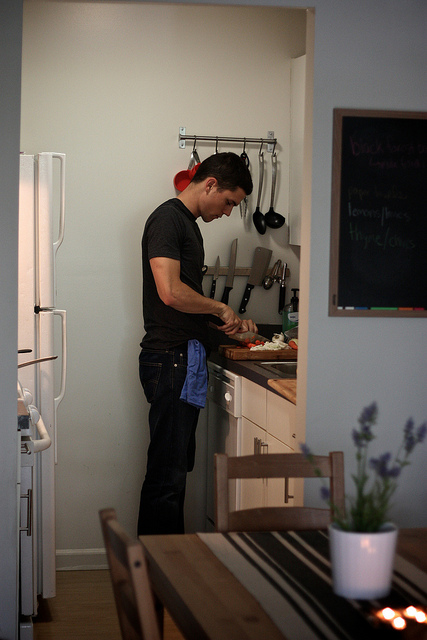 Years ago, I read an article by a chef and food writer for the New York Times. His article was about how shocked people are when they see his kitchen. He lives in a tiny New York apartment, and the kitchen is barely big enough for one person to work in. People always assume he has a massive, high-end kitchen with all the latest tools and gadgets.
Years ago, I read an article by a chef and food writer for the New York Times. His article was about how shocked people are when they see his kitchen. He lives in a tiny New York apartment, and the kitchen is barely big enough for one person to work in. People always assume he has a massive, high-end kitchen with all the latest tools and gadgets.
His point was that equipment does not give someone the talent for cooking. Cooks cook. It doesn’t matter where they are or what they use.
I think of that when I talk with some RCIA teams. Some teams are always interested in the latest catechetical tool. Is there a book for this or an outline for that? Is there a PowerPoint or a handout that will make the teaching of the church clear to the catechumens?
In the RCIA, teachers teach
Tools can be helpful, but the bottom line is teachers teach. You can drop a talented catechist into a room of people with no preparation and no tools and he or she can lead that group to a deep insight about the person of Jesus. The talent for teaching does not come from the tools.
You’ve met people like this. You were probably influenced by someone like this. Perhaps that’s why you are a catechist today—because you encountered a talented catechist in your life. Focus on that person for a minute. What was his or her secret? What made that catechist a good teacher? I’m sure it wasn’t the textbook or the handouts. It was probably that person’s ability to share with you his or her experience of Jesus in a way that moved you to deeper faith.
People sometime use the tools as a crutch. They don’t want to put in the hours of discipline it takes to upgrade their own knowledge and skills. So instead they spend hours looking for shortcuts. The simple fact is, you don’t need the latest books and resources to be a great RCIA catechist. What you need is a passion for helping people discover Jesus in their lives.
Disciplines for an RCIA catechist
If you know the Creed, then you already know all the content you will ever need to be an effective catechist. You job now, your discipline, is to immerse yourself into every promise and implication embedded in the Creed. Read more, go to workshops, engage in dialogue, ask questions of yourself, your colleagues, and your mentors. Always be curious. Always explore. Tell stories. Listen to stories. Watch for God moments. Practice gratitude. Forgive someone. These disciplines will make you a better teacher.
It is not the tools that matter. What matters is your own relationship with Jesus and how well you can open yourself up to others so they can learn from what you have learned.
Share your story
Who has been an influential catechist in your life? What did you learn from him or her about how to teach? What is your discipline for becoming a better catechist?
See also these related articles:
“Wannabe chef” by Sean Kelly | Flickr









Dear You-two, Thanks for the reminder to think back and be grateful for MY best catechists: my grandmother and my aunt! Their love of Jesus was in so much of what they did.
How I remember never being able to leave their home without their blessing! How they spoke so freely of love of God and love of Jesus. I was blessed. Thanks again,
Eldita Loredo